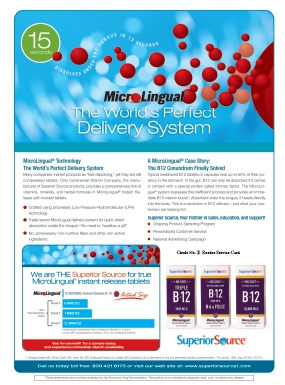Dietary supplements have long been considered an important component of a well-balanced health routine. People turn to these products for general reasons, such as filling nutrition gaps and maintaining overall health and wellness—and to support specific systems within the body such as heart, bone and digestive health. Many consumers are devoted to their supplements and believe they are integral to their wellness pursuit. And while supplements do have an important role in health maintenance, one must keep in mind that there are things that supplements don’t do, and consequently, rules about how supplement benefits can be discussed with customers. It’s essential that those assisting consumers at the point of purchase discuss these products accurately (and legally), and that consumers understand how supplements are meant to be taken—as part of a comprehensive approach to wellness.
Supplement Regulations
In the United States, dietary supplements are regulated as a category of food by the U.S. Food and Drug Administration (FDA) under the Dietary Supplement Health & Education Act (DSHEA) of 1994. The Federal Trade Commission (FTC) regulates the marketing and advertising for these products. These two separate laws demand that all labeling and all marketing claims for supplements be truthful and non-misleading, and be scientifically substantiated. And while the vast majority of claims are well within the scope of the law, I frequently remind consumers that if a supplement claim sounds too good to be true, it likely is. I would encourage retailers to follow that logic when promoting a supplement; you can’t tell consumers that supplements will cure a disease or work in place of a prescription drug. Supplements are meant to be supplements to, not substitutes for, a health  regimen— not to act as magic bullets to take the place of healthy habits or prescription drugs. Further, under the law, supplements are not allowed to be sold with treatment or curative claims.
regimen— not to act as magic bullets to take the place of healthy habits or prescription drugs. Further, under the law, supplements are not allowed to be sold with treatment or curative claims.
These admonitions are particularly timely because earlier this year, the Government Accountability Office (GAO) published the findings of a federal investigation that was reviewed in a May 26 U.S. Senate Special Committee on Aging hearing. The report raised concerns about unsupported or overstated marketing claims made by retailers who were either unaware of, or willingly ignoring, dietary supplement advertising laws. Perhaps, the retail clerks were enthusiastic about a product and wanted to get that message across to the consumer; perhaps, they were stretching the truth in order to make a sale. Regardless, advising consumers that a particular supplement can be taken in place of a prescription drug or that supplements can cure a disease is illegal and doing so comes with heavy penalties.
The responsibilities associated with making supplement claims are shared across the supply continuum—it begins with the scientists, regulatory affairs experts and marketers who develop labels and marketing materials for a particular product, and continues through to retailers’ comments made when talking with consumers. The interface between customers and sales associates at the point of sale is an important exchange because you can help guide customers to the supplement product that best makes sense for their individual needs. We know that consumers are often confused when they enter a supplement store or aisle; this is where retailers can greatly assist their customers.
Talking about Supplements with Shoppers
Are you unclear about the best ways to go about discussing supplements with customers while staying compliant with advertising laws? The following are tips for retailers:
1. Understand the laws governing supplements.
You’re selling these products to the general public—study up on how supplements are regulated. This will protect you legally when discussing supplement benefits and give you confidence when talking with customers. A good example of this is understanding label claims. Being aware of the kinds of claims manufacturers can make on the packaging can help guide you in what you can say to customers.
Manufacturers are allowed to make three basic types of legal claims on the bottle: 1) nutrient content claims to characterize the level of vitamins and minerals in the product; 2) structure/function claims to describe the basic benefits of the product; and 3) FDA-approved health claims that describe the relationship between a substance and reduced risk of a disease (such as calcium and vitamin D in relation to osteoporosis). It’s wise to stick to what is on the label or in a manufacturer’s promotional material when discussing supplements because the language used should already be within the scope of the law.
2. Get to know the supplement label.
Speaking of the label, you should familiarize yourself with supplement labels in general. Recently, the Council for Responsible Nutrition conducted a survey of consumers to determine their usage and understanding of supplement products and found that the Supplements Fact Box (e.g., containing dosage, daily value and ingredients among other things) and label claims (e.g., maintain heart health, maintain joint health) are among the most important factors for consumers when it comes to purchasing supplements. Understanding the label will better prepare you for questions regarding a particular supplement’s ingredients, health benefits,daily dosing and more. Ask your place of business about label information. The Council for Responsible Nutrition also has a sample interactive label located on its Web site (available at http://crnusa.org/about_label.html).
3. Encourage consumer/healthcare practitioner dialogue.
Consumers should get health advice from their doctors or other healthcare professionals. Period. As the retailer, you are there to guide customers in their supplement options, not offer medical advice. While you may feel enthusiastic about a particular supplement, you must remember that when selling supplements, your eagerness must be limited to what you can say under the law. A healthcare practitioner is appropriately trained to give consumers medical advice, and consumers should already be updating their physician (and other healthcare professionals such as nurse practitioners and registered dietitians) about the supplements they are taking or considering. It’s responsible to encourage your customers to have an open dialogue with their healthcare practitioner about supplements, and it demonstrates that you are putting the consumer first when you do.
4. Help consumers get educated.
The number one thing I hear from consumers regarding dietary supplements is that they are confused and overwhelmed by the number of options available. I tell them to start with the basics— after a consultation with a medical professional, determine what best makes sense for their lifestyle/life stage, dietary needs, etc., and then go with a brand that is well-established, and one they know and trust. The in-store kiosk, educational materials from the manufacturer and third-party literature can be excellent resources for consumers—and the kinds of things that retail clerks can suggest to customers looking for more information. You will also do customers a service by reiterating that when searching for the right supplement, they should be wary of claims that seem too good to be true. Customers who are looking for a quick fix to a particular health issue are in the wrong location—supplements don’t work that way.
Regarding education, it’s also a good idea to continually update your training. Take advantage of company training programs, trade association workshops and other industry educational efforts so that you are aware of emerging science and revised policy and regulatory matters. Tradeshows, web seminars and other interactive programs provide ongoing support to optimize staff training, while minimizing risks associated with noncompliant advertising.
In short, don’t feel overwhelmed when it comes to what you can and can’t say about dietary supplements. Take every opportunity to learn more about these valued products and keep in mind that the responsibility of appropriate supplement marketing is not limited to what you see in marketing materials or in television advertising. Everyone involved with the sale of supplements shares the responsibility to ensure that the most accurate (and helpful) information reaches our consumers. WF
Douglas “Duffy” MacKay, N.D, is the vice president, scientific and regulatory affairs at the Council for Responsible Nutrition. He is a licensed Naturopathic Doctor and was a co-owner and practitioner in a family-owned New Hampshire integrative medicine private practice for seven years. In addition to his hands-on experience as a practitioner in the field of integrative medicine, he spent eight years working as a medical consultant for two companies in the dietary supplement industry. Dr. MacKay has published articles in peer-reviewed journals, and serves on the editorial board of two peer-reviewed publications: the clinical journal Alternative Medicine Review and the official publication of the American Association of Naturopathic Physicians, Natural Medicine Journal. Dr. MacKay earned his B.S. in Marine Sciences from the University of California, Santa Cruz and his N.D. from the National College of Naturopathic Medicine in Portland, OR.
Published in WholeFoods Magazine, December 2010










